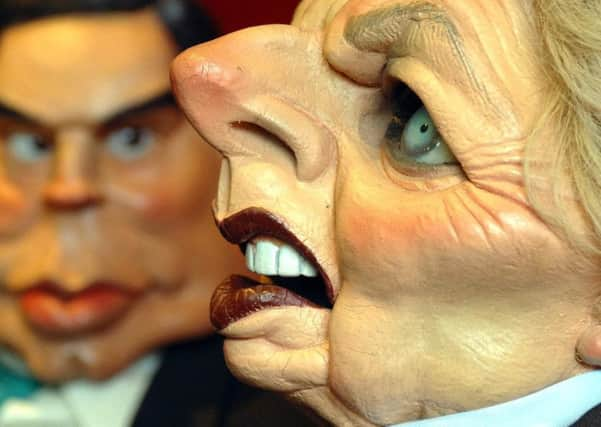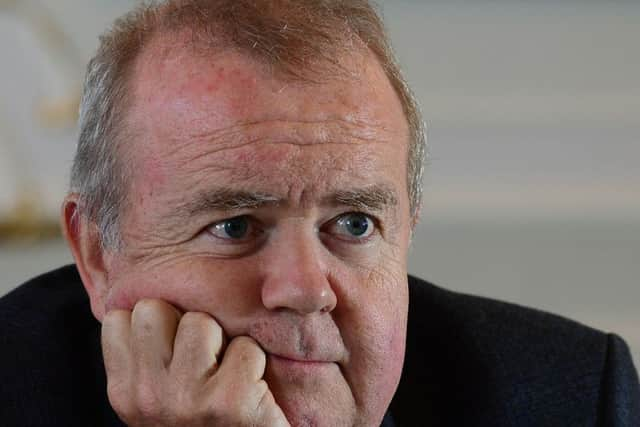Ian Hislop - Have I got views for you...


As well as eliciting a sharp intake of breath, last week’s shock general election result had political pundits and pollsters frantically trying to fathom out how, and why, they had got it so wrong. Again.
Perhaps Michael Gove was right after all when he opined during last year’s fractious Brexit campaign that people in this country “have had enough of experts”.
Advertisement
Hide AdAdvertisement
Hide AdThe irony’s not lost on Private Eye editor Ian Hislop. “I had to admit that I seemed to know as little about what was going on as everybody else,” he says, with a self-deprecating chuckle. “It’s the third time now that those in the know proved to know nothing at all.”


Even so, on reflection he feels it was a positive result. “I think it was the British public saying they don’t like being told what to do. During the last couple of years I’ve been saying to people that I’m not predicting anything because you just don’t know. I think what happened this time was ‘Project Fear’ ran out of steam. People do get bored of being afraid.”
He’s critical of the way much of the mainstream press covered the election and feels they aren’t serving their readership. “They’ve got to do better. I’m a great champion of print but it’s no good saying ‘no one buys newspapers’, because you just want to say ‘well, look at them’.
“They kept saying that if you vote the wrong way you have no idea what is going to happen and people’s reaction was ‘well, no we don’t’. And I think that’s the overall lesson. People like Lynton Crosby and the theorists of how you win elections were wrong.”
Advertisement
Hide AdAdvertisement
Hide AdDuring the election, Labour leader Jeremy Corbyn attracted huge crowds on the campaign trail just as his predecessor Michael Foot did back in 1983, when he gave rousing speeches in front of 30,000 people at rallies. The difference this time was that Corbyn fared much better.


“Michael Foot kept saying he was bound to win because of the number of people turning out. I can’t remember who it was but one of his colleagues said to him, ‘yes Michael, but the people who don’t turn out are at home watching the television and they don’t like you very much’, and they were right.”
Equally, despite proving his critics wrong and performing far better at the ballot box than had been predicted, Corbyn still lost. “You can get over excited if you look at the actual vote. Corbyn did much better than anyone thought he would but it wasn’t enough to win and in terms of numbers it’s no better than a number of his predecessors who weren’t given accolades.”
That said he believes the election marks a real shift in the political balance of power, particularly towards younger voters. “I don’t want to patronise young people but I’m on record as saying ‘you didn’t vote on Brexit and the big losers there are you, so next time there’s a vote why not go out and do it,’ and they did.
Advertisement
Hide AdAdvertisement
Hide Ad“Fifty seven percent of the population goes to university now and they’re aware of what’s going on, and they are looking at Brexit and thinking ‘this is a terrible idea for us’.”
He says one of the most interesting aspects of the election was the blind tasting of manifestos. “If you read things like nationalisation of the railways and interfering with the energy market, many people would have thought these were good ideas and might well have thought this was the Tory manifesto, it wasn’t clear.
“The Tory ideas about shifting wealth from the older generation to the younger generation in any other circumstances would have been quite brave, but in this case was bloody stupid.”
Hislop is best known for being a team captain, along with Paul Merton, on the BBC’s long running and hugely popular satirical news quiz Have I Got News For You, and he was in Sheffield this week discussing the role of satire and ‘post-truth’ with Jolyon Rubinstein, co-creator of the satirical TV show The Revolution Will Be Televised, as part of Sheffield Doc/Fest.
Advertisement
Hide AdAdvertisement
Hide AdMuch has been made about satire and whether in the so-called ‘post truth’ era, a phrase used to try and capture the gut-instinct, anti-establishment politics that swept Donald Trump and Brexit supporters to victory, it still packs a punch.
Hislop is unequivocal in his conviction that it does. “If no one knows what’s going on then it means there’s more to say. You have to work harder and you have to find the targets but periods of change like this are usually good for satire.”
This is backed up by the fact that Private Eye’s UK sales are at an all-time high, up 25 per cent compared to five years ago, which he puts down to the Brexit vote and Donald Trump becoming US President. “The reaction to his win has been pretty sensational. Most mainstream TV channels have got a satire show on that’s really good. Sometimes Saturday Night Live is really good and sometimes it’s terrible. At the moment it’s great and it hit a nerve.
“Donald Trump doesn’t tweet late at night about how awful the Democrats are, he doesn’t care. What he hates is Saturday Night Live because it makes his own supporters think he might be an idiot and if he’s an idiot then they are for voting for him, and that hurts - that’s when satire gets useful.”
Advertisement
Hide AdAdvertisement
Hide AdAs well as holding those in power to account, he says that the job of satirists is to act as curators in helping to bring attention to news and stories that might have slipped under the radar. “It’s about focusing on a story that a lot of the time may not be hugely interesting or may seem complicated and framing it in a way that’s funny and that’s one of the things satire can do.”
People often hark back to a supposedly golden era of satire during the Sixties and shows like Beyond The Fringe and That Was The Week That Was and their brand of anti-establishment comedy.
But Hislop doesn’t buy into this. “People are very nostalgic and the older I get the more obvious it is. I hear young people talking about Spitting Image and saying how extraordinary it is. I look back having written on the first series and at the time I thought it was terrible and wondered was anyone actually watching? So I’m careful about looking back through rose tints.”
At the same time, though, he believes that satire has something worthwhile to say about society. “It might go in and out of fashion, but I don’t think it goes away. I don’t want to overstate its importance but I do think it’s a very useful way of looking at the world.”
Advertisement
Hide AdAdvertisement
Hide AdHe mentions the DUP whose leaders are finalising the details of an agreement with Theresa May to help prop up her minority government. “People say ‘oh, they’re the unionists.’ No, there used to be unionists who were in the middle, the DUP are the ones on the right. It’s a different lot, this gang.
“So a bit of historical memory mixed with the idea of finding things funny rather than scary... I think there’s still something to be said for that.”
Great British satire at its best
There have been some terrific satirical TV shows over the years, here are three of the best:
Yes, Minister - Witty, clever and brilliantly subversive, it pitted the hapless Jim Hacker (Paul Eddington) against his Permanent Secretary, Sir Humphrey Appleby (Nigel Hawthorne) with Bernard Woolley, played by Derek Fowlds, stuck in the middle.
Advertisement
Hide AdAdvertisement
Hide AdSpitting Image - At its peak, the show pulled in 15 million viewers who tuned in to see politicians and celebrities routinely cut down to size.
The Thick of It - Created by Armando Iannucci it has been described as the 21st century’s answer to Yes Minister. In Malcolm Tucker, played to perfection by Peter Capaldi, it had one of the greatest all-time TV characters.